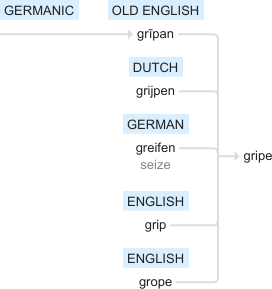Gripe
Old English grīpan ‘grasp, clutch’, of Germanic origin; related to Dutch grijpen, German greifen ‘seize’, also to grip and grope; gripe (sense 1 of the verb), of US origin, dates from the 1930s.
wiktionary
From Middle English gripen, from Old English grīpan, from Proto-Germanic *grīpaną, from Proto-Indo-European *gʰreyb-(“to grab, grasp”). Cognate with West Frisian gripe, Low German griepen, Dutch grijpen, German greifen, Danish gribe, Swedish gripa. See also grip, grope.
etymonline
gripe (v.)
c. 1200, "to clutch, seize firmly," from Old English gripan "grasp at, lay hold, attack, take, seek to get hold of," from Proto-Germanic *gripan (source also of Old Saxon gripan, Old Norse gripa, Dutch grijpen, Gothic greipan, Old High German grifan, German greifen "to seize"), of uncertain origin, perhaps from PIE root *ghreib- "to grip" (source also of Lithuanian griebiu, griebti "to seize"). Figurative sense of "complain, grouse" is first attested 1932, probably from earlier meaning "produce a gripping pain in the bowels" (c. 1600; compare belly-ache). Related: Griped; griping.
gripe (n.)
late 14c., "a fast hold, clutch, grasp," from gripe (v.). From c. 1600 as "cramp, pain in the bowels" (earlier of pangs of grief, etc., 1540s). Figurative sense of "a complaint" is by 1934.
